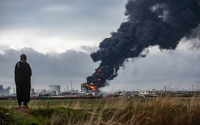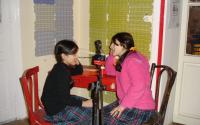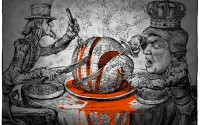It was a shame for Turkey that, just when Opportunity knocked, Misfortune was already at home.
Turkey was one of the few countries to which the 11 September atrocities presented a silver lining as well as the pall of macro-economic instability and individual disaster.
Its geographical position as a bridge between Europe and the Middle East, its acceptance culturally of both Islam and Levi's, should have allowed it to demand from the West a heavy toll in political and economic favours.
Instead, a year on, Turkey finds itself hostage to economic and political challenges.
And rather than setting the tempo, it finds itself confronted with demands from the European Union and the International Monetary Fund.
New cash
Certainly Turkey no longer has cause to berate the IMF, as Prime Minister Bulent Ecevit did before 11 September.
The IMF was "hurting Turkey at home and abroad" by delaying a $1.6bn loan until privatisation reforms were introduced, Mr Ecevit said in July 2001.
Yet by November, Turkey had won $3bn in IMF cash, and six months ago was granted, provisionally, a further $12bn in funding.
"But the question you have to ask is whether Turkey would have been granted that money anyway, even without 11 September," said Merli Baroudi, Turkey expert at the Economist Intelligence Unit.
"It was already recognised as a strategically important country for the US."
Turkey is, after all, a fellow member of Nato.
"While the IMF money might not have come through so quickly, it is not likely that Turkey would, whatever, have been allowed to collapse."
Disappointment
As for its relations with Europe, Turkey has found that it apparent spell in the international limelight has done little to sway audiences at the European Commission.
Only on Saturday, EU Enlargement Commissioner Guenter Verheugen warned that Turkey this year might not make headway in its longstanding effort to win union membership.
This despite reforms, such as the abolition of the death penalty and extra rights for Kurds, which Brussels had demanded as pre-requisites for accession talks.
Mensur Akgun, researcher at the Istanbul-based Turkish Economic and Social Studies Foundation, said: "That statement was extremely disappointing for people here. It caused enormous feeling.
"We feel we have done so much to meet EU conditions, and we expect something in return.
"Otherwise the support for EU membership, which has been put at 70%, could prove fragile."
Chances fumbled
So how has Turkey managed to eke such modest returns from fertile negotiating ground?
Through playing its hand with all the insight of a snap novice at a poker table, said Klaus Becher, senior fellow for European security at the International Institute for Strategic Studies.
"What particularly the US wanted to see after 11 September was for progress to be made in resolving other disputes," Mr Becher said.
"Making progress over the Cyprus question - an opportunity was missed.
"And Turkey would have hoped to be perceived as making progress in its dispute over the roles of a European defence force versus Nato."
In fact, Greek objections to a Turkish condition limiting the role of a common European defence force to stop it intervening in Cyprus have yet to be overcome.
Double blow
Unfortunately for Turkey, the 11 September crisis occurred when the country was not just economically weak, and recovering from its worst recessions since World War II, but politically delicate too.
Ms Baroudi said: "You have the country ruled by a three-party coalition which people have long predicted would fall apart.
"You have a prime minister in ill-health - it is a difficult position on which to build."
Mr Becher compared Turkey's malaise with the gusto with which Russia's president, Vladimir Putin, seized his political opportunities.
"Putin saw the chance to bring in to the fold a country which had for ever been regarded as an outcast, a faded superpower, and turn it into a major ally of the US."
Piggy in the middle
Turkey, a year on, is faced not with challenges of how to exploit Western ties, but how to maintain them.
The country in November faces elections at which the pro-Islamic AK Party is tipped to make major gains.
It also faces the prospect of a war led by a Nato ally - the US - against Turkey's geographical neighbour - Iraq.
Mr Akgun said: "That puts us in an extremely difficult position.
"No-one here is a friend of Sadaam. But as for attempting to topple him from power, there are real questions about the legitimacy of that."
Changing fortunes
Besides, siding unquestioningly behind the US would threaten Ankara's credibility in the Middle East.
And the conflict threatens to stoke nationalism among Iraqi Kurds which could spread to their cousins on the Turkish side of the border.
"September 11 - yes, it might have been a blessing initially for Turks," Mr Akgun said.
"We probably got more funds from the IMF than we would have otherwise.
"But now you can say it is moving towards being a curse."
http://news.bbc.co.uk/1/hi/in_depth/world/2002/september_11_one_year_on/2231027.stm






